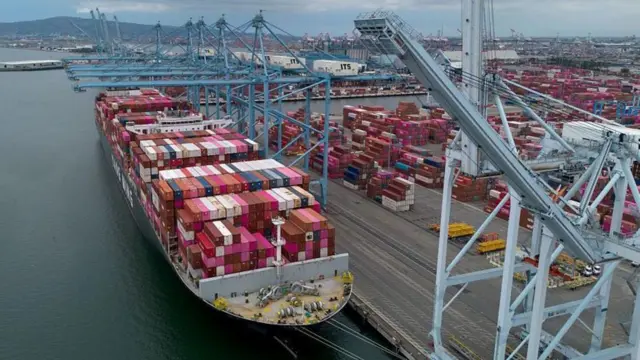
Do London talks succeed in ending the "trade war" between the United States and China?
Today, Monday, a new round of talks between the United States and China will start today, Monday, aimed at settling the ongoing trade conflict between the two countries.
On Friday, US President Donald Trump announced that a high -level American delegation would meet Chinese representatives. During the weekend, Beijing confirmed the presence of the Deputy Prime Minister, Living, the talks.
This comes after a phone call between Trump and Chinese President Xi Jinping last week, which the American president described as a "very positive conversation."
During the past month, the United States and China, the two largest economies in the world, agreed on a temporary truce to reduce customs duties on the goods circulating between them, but since then each party charged the other party of violating the agreement.
Trump said that the US Treasury Secretary, Scott Besent, and the Minister of Trade, Howard Lottenic, and commercial actor Jimson Jarir will meet with Chinese officials in London on Monday.
The most finished reading
The Chinese Ministry of Foreign Affairs announced on Saturday that Chinese Vice President Xi Jinping will visit the United Kingdom from 8 to 13 June, during which a meeting of the economy and trade mechanism between China and the United States will be held.
The new round of negotiations started after Trump's statement that his phone call with Shi on Thursday focused mainly on trade and "resulted in a very positive result for both countries."
The China News Agency (Xinhua) reported that Shi informed Trump that "the United States is back away from the negative measures it has taken towards China."
This call was the first to make the two leaders since the beginning of the trade war in February.
When Trump announced earlier this year the imposition of comprehensive customs duties on the imports of several countries, China was the most affected, and Beijing responded to an increase in customs duties on American imports, which led to the imposition of similar increases of 145 percent.
The talks in Switzerland last May resulted in a temporary truce that Trump described as "a comprehensive reset."
The United States has reduced customs duties on Chinese products to 30 percent, while China has reduced American imports to 10 percent, and pledged to lift barriers in front of biological mineral exports.
The United States has stopped sales of some technologies to China, including semiconductors, while Beijing imposed restrictions on rare and magnetic mineral exports.
Soytha Ramashandran, director of the leading consumer brands strategy (Artemis), told the "Today" program on BBC in the participation of Lootnick in the conversations was "a welcome addition."
"It seems that there is a clear focus on rare minerals, as China, of course, dominates production in this field," she added.
"China extracts 69 percent of the rare ground minerals in the world, which is very necessary to develop technology in the United States, so I think there are enough papers on the table to make it acceptable to both sides to achieve the desired results."
The agreement that was reached last May gave the two parties a 90 -day deadline to try to conclude a trade agreement.
The recent data published by Beijing on Monday showed that China's exports in May were less than analysts' expectations, despite the declared truce.
China's exports to dollars witnessed 4.8 percent, compared to the same period last year. Meanwhile, imports decreased by 3.4 percent, which was much worse than expected by 0.9 percent.
Since then, relations between the United States and China have witnessed a remarkable deterioration. Last month, US President Donald Trump accused Beijing of "a complete violation" of the agreement between the two countries, while China responded a few days later, accusing Washington of "serious violation" of the same agreement.
The United States has also accused China of not resuming biomedics shipments and rare ground elements, which are necessary for auto and computers.
In a later development, the Chinese Ministry of Trade announced on Saturday its approval of a number of requests for exporting rare ground minerals, without clarifying the countries to which they will be issued.
This announcement comes after Trump said on Friday that Shi agreed to resume trade in rare ground elements.
"Exports of basic minerals began to flow at a higher rate than before, but it is still below the level that we believe we agreed in in Geneva."





.jpeg)


ليست هناك تعليقات:
إرسال تعليق